Counting back to Kona: 2016 Ryf shatters the record, Frodeno leads a German sweep
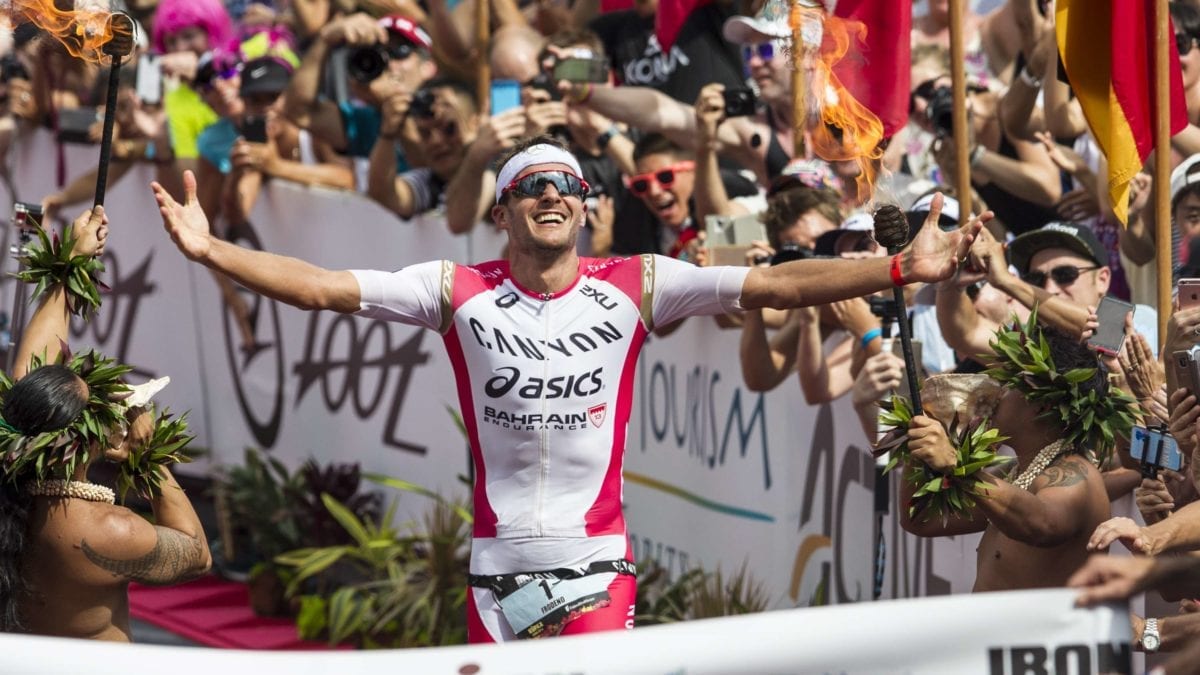
The 2016 Ironman World Championship offered two different forms of dominating performances. In the men’s race we saw Jan Frodeno lead a podium sweep for Germany, while the women’s race was the Daniela Ryf show – the Swiss star shattered the course record and the rest of the field.
Germany takes the podium
In 1997 I was in Kona for the Ironman World Championship in part as a coach – I worked with Lori Bowden and Lisa Bentley at the time – and also to cover the event as a freelancer for CBC Radio.
Earlier that week I had interviewed Thomas Hellreigel, the runner-up from a year earlier, and asked him how he thought Peter Reid might fare in the race.
“Peter won’t be with us in Hawi,” he said.
“But he beat both you and Jurgen [Zack] in Australia this year,” I said. “You don’t think he can ride with you?”
Exasperated, Hellreigel gave me a look, grabbed my microphone and said:
“Peter…will…not…be…with…us…in…Hawi.”
A few days later I got to see just how frightening the German juggernaut can be when it comes to racing in Kona. Hellreigel and Zack hammered through the bike. Along the Queen K they pushed the pace so hard that Reid, who gamely tried to hang on, was shattered by the time he got to the famed 7-11 store in Kawaihai that signals the start of the long climb up to Hawi. Reid saw his coach, Roch Frey, in the parking lot and climbed off his bike.
“I’m done,” he said. (Frey would insist that Reid get back on his bike – the Canadian would eventually run his way to fourth, setting up his first Kona win the next year.)
After dispensing with Reid and the rest of the field, Hellreigel and Zack would ride and run their way to the championship. Third that day went to Lothar Leder. The German domination continued – in the end there were five Germans in the top 10.
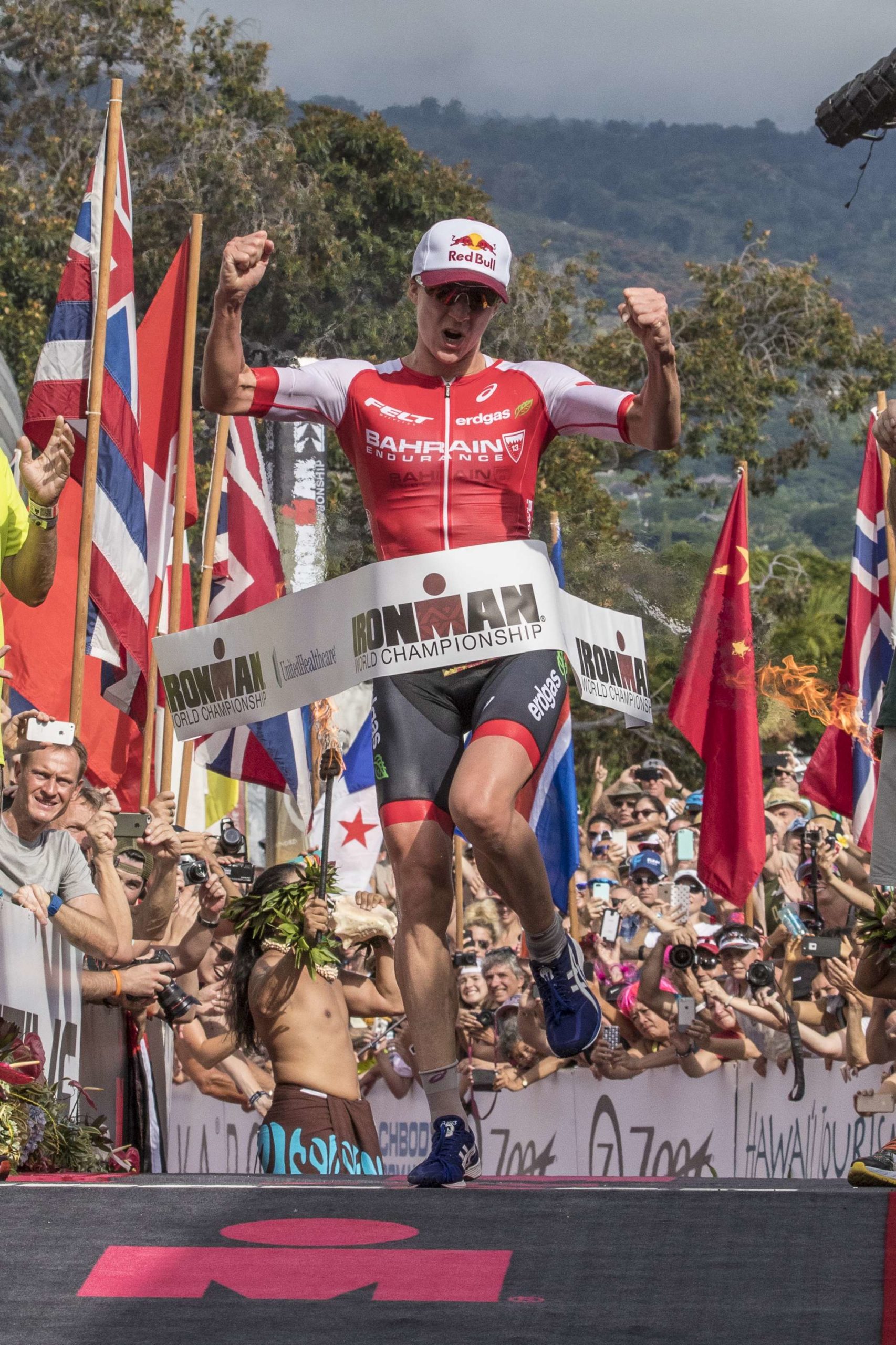
Fast forward 19 years. Rather than wait for the 20th anniversary of the all-German podium, Jan Frodeno, Sebastian Kienle and Patrick Lange decided they would do the repeat performance a year early. Add in Andreas Boecherer (fifth) and Boris Stein (seventh) and you have five in top 10, too.
Oh, and the top age group racers on the day? German, too.
If the men’s race was dominated by the Germans, the women’s race was an all-Swiss show that starred Daniela Ryf, who took the race in record-setting fashion, posting the eighth-fastest swim, fastest bike by eight minutes and even out-ran the sport’s premier runner, Mirinda Carfrae, to annihilate the course record by a whopping six minutes with her 8:46:46 finish, almost 24 minutes ahead of runner-up Carfrae, the previous record holder.

Ryf Dominates
Coming into this year’s world championship,whenever someone asked me to predict the women’s race, I offered two scenarios: really boring if the Daniela Ryf I saw “rocking Roth” (where she smiled her way through an 8:22 performance, literally dancing across the finish line to record the second-fastest full-distance time ever) appeared, or really exciting if we saw the same woman who “struggled” to fourth in Mooloolaba.
Unfortunately for the rest of the women, the “Roth Ryf” was on the Big Island for this year’s race.
It didn’t look like that at first. Out of the water the women’s race looked like we were going to finally witness a close contingent battling things out on the bike, similar to what we’re used to in the men’s race.
Led by Meredith Kessler (52:46), 12 women came out of the water within nine seconds of each other. Following Kessler you had 2012 champ Leanda Cave, Ironman Asia-Pacific champion Jodie Swallow, Annabel Luxford, Canadian-turned-American (but we’ll still claim her) Alicia Kaye, Mary Beth Ellis, Camilla Pedersen, Ryf, Germany’s Anja Beranek, Laurel Wassner, Michelle Vesterby and Katja Konshcak.
Carfrae would exit the water four minutes down alongside Canadian Heather Wurtele, while another of the race favourites, Melissa Hauschildt, would hit the bike course six minutes behind the leaders.
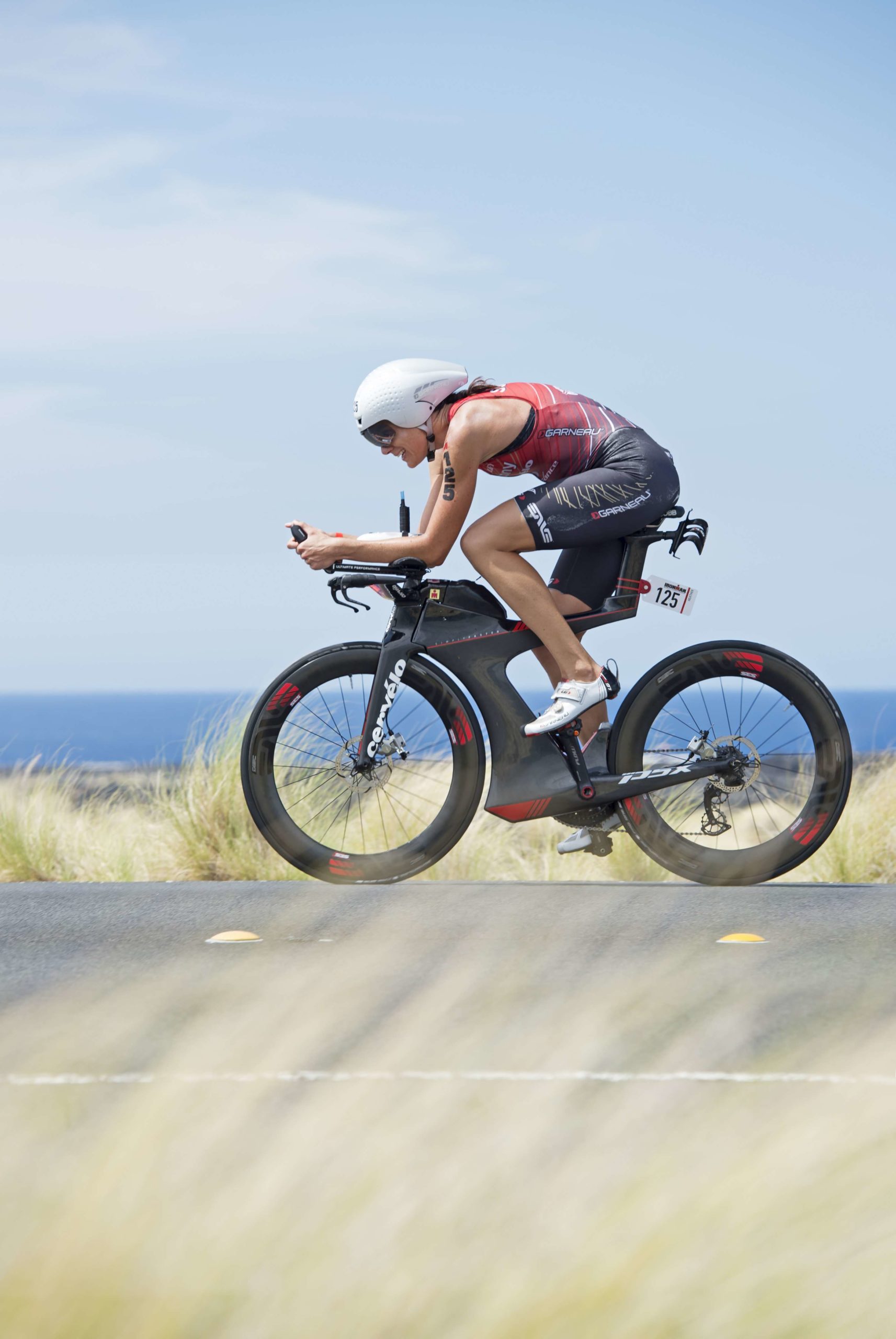
Once out on the bike course Kessler and Vesterby seemed to be the most aggressive riders during the early portions of the race, with Kaye even popping up at the front on occasion. Then, just as we were preparing ourselves for a group ride up to Hawi, Ryf took off.
Frightening Ryf fact: she didn’t even think she was taking off.
“We were all just taking turns at the front,” she would say later at the press conference. “I went to the front and then no one came by.”
Ryf then proceeded to ride away from the group. Only Beranek would try to stay with the defending champion, which she managed to do until the turn in Hawi, at which point Ryf simply used her incredible power to fly away on the downhill and leave the German in no-women’s land.
By the time the ride was done Ryf had literally shattered the race. Beranek got off the bike eight minutes behind. Heather Jackson was next – she was a whopping 14 minutes behind. Consider these splits – the women we consider amongst the best cyclists in the sport were well behind Ryf: Kessler trailed by 15 minutes in sixth. Vesterby was 16:36 down in seventh. Hauschildt was over 19 minutes down. Two years ago Carfrae overcame a 14-minute deficit on the run to beat Ryf. It was hard to imagine she had a shot at taking the title looking at a 22:14 gap off the bike.
Carfrae is not one to ever quit, though, and after having to pull out last year suffering the effects of being hit by a car a few days before the race, she returned to the podium (she has finished in the top three in seven of her eight Kona appearances) by running through the field to take second.
“It wasn’t my perfect race that I hoped for,” Carfrae said after the race. “I just kept battling. I was the best of the rest – Daniela was in another zip code.”
And that’s hardly an exaggeration. As we watched an exciting race unfold for the rest of the spots, Ryf was flying through the run course. Beranek would hang on to second until 10 miles, at which point Jackson moved into the “best of the rest” position. Carfrae would eventually run herself past 12 women to take second, with Jackson and Beranek hanging on for third and fourth.
Waiting for all of them at the finish line was Ryf, who used the 24 minutes she had to wait for interviews and to celebrate her new course record with family and friends. Later, at the press conference, we learned that even though her coach, Brett Sutton, wasn’t on the island (he has a criminal conviction from his home country of Australia that bars him from coming to the United States), his influence on the pro – ceedings was huge.
“The run was phenomenal for me,” Ryf said after the race. “It was the run I always hoped for. I started strong and finished strong. And knowing with 4 km to go that I was on record pace, my coach texted my friend – he gave me the green light if I wanted to go for it. It was a day for me and my support team to remember.”
It was actually a day we’ll all remember. A curious mix of showing just how competitive the women’s race can be and just how good Daniela Ryf is.

Frodeno’s Frightening Year
Part 2
In winning both the Ironman 70.3 and Ironman world championships last year, Jan Frodeno became one of the most famous sports personalities in Germany. The 2008 Olympic gold medallist was Germany’s athlete of the year in 2015, won a prestigious Laureas award and was in demand with sponsors and media alike.
In February Frodeno and wife Emma Snowsill, another Olympic gold medallist, celebrated the arrival of son Luka. (How scary is that gene pool?) Frodeno had won the first leg of the “Triple Crown,” Ironman 70.3 Dubai, which would reward him with a million dollars if he could defend his 70.3 world championship and take the final leg of the series in Bahrain in December.
Then the wheels fell off. A huge tear in his calf forced him to pull out of Ironman South Africa, where he’d planned on validating his Kona slot. He had to head to Ironman Lanzarote, where he finished second to American Jesse Thomas, to get the Ironman qualifying out of the way. Frodeno then focused his efforts on setting a new world-best time for the full-distance at Challenge Roth. His 7:35 clocking did that in style, but after the race Frodeno said he was both emotionally and physically shattered.
He decided to pass on the 70.3 worlds in Mooloolaba to focus on defending his Kona title.
Which was hardly going to be easy. Frodeno has always said that there’s nothing more challenging than racing a “motivated Sebastian Kienle.” Calling Kienle “motivated” this year is a huge understatement. The amicable German has been on edge for much of the year, singularly focused on getting the title he won in 2014 back. In Frankfurt for the Ironman European Championship, Kienle hammered on the bike but was even more aggressive on the run, as if to prepare himself for the challenge he knew lay ahead in Kona. In Mooloolaba Kienle was frustrated not to have been able to outkick Tim Reed for the title. (When asked at the pre-race press conference how he felt about the race in Mooloolaba, Kienle joked, “All I can say is that Tim Reed doesn’t want to be in a sprint with me any time soon.”)
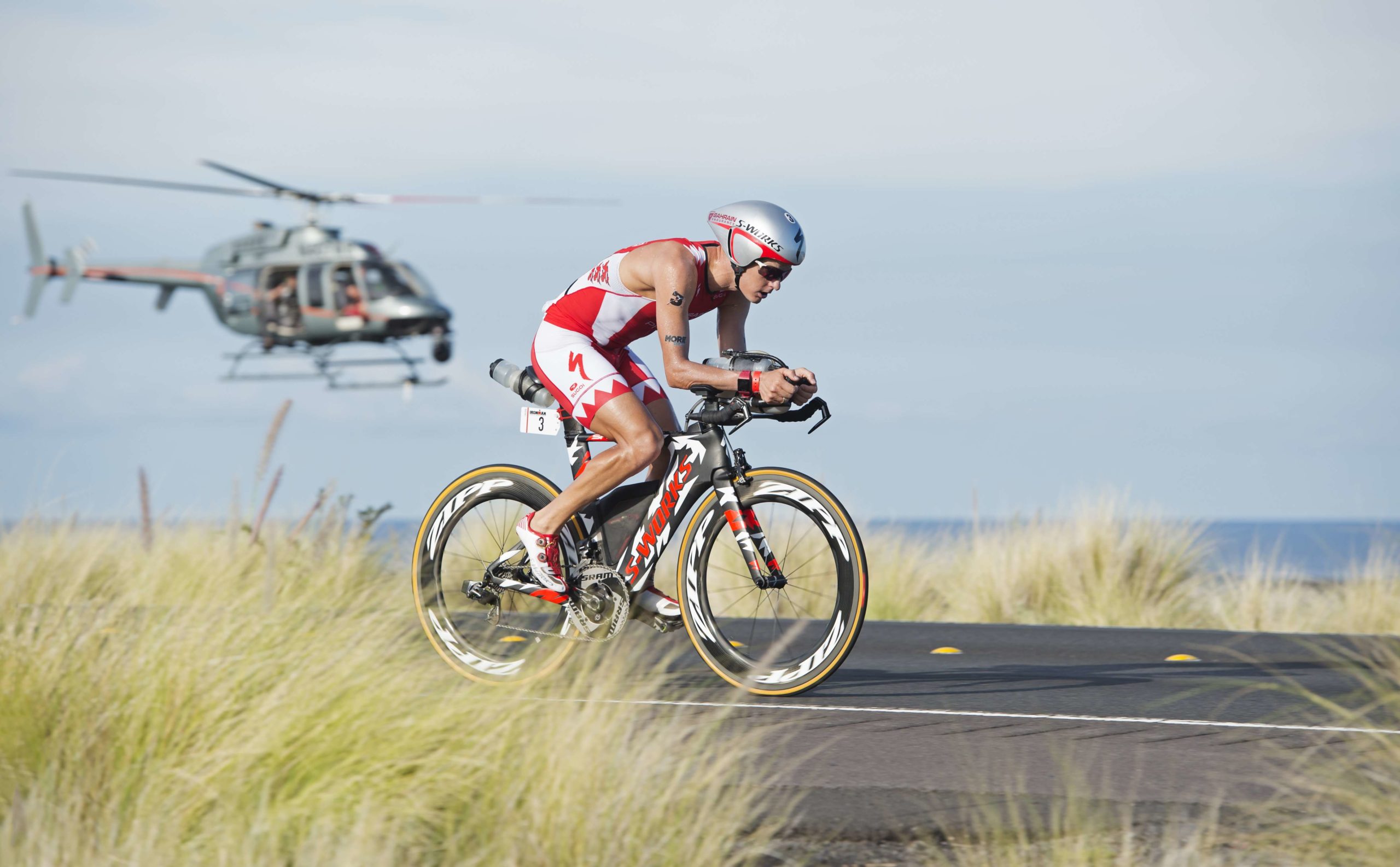
Which set us up for the dramatic men’s race that unfolded.
As we’re used to seeing, Frodeno was amongst the swim leaders, but ended up not happy with the result of the swim. As he tried to drive the early pace, Harry Wiltshire positioned himself really tightly on Frodeno’s hip, hindering his ability to finish his stroke. So, instead of pulling away in a small group, Frodeno found himself coming third out of the water behind Wiltshire and Andy Potts and with lots of company – 12 men were within 16 seconds heading into T1 including Canada’s Brent McMahon, Germany’s Andreas Boecherer, American Tim O’Donnell and the U.K.’s former ITU world champ Tim Don.
Kienle would find himself four minutes down out of the water, but “had great bike legs” and was able to ride his way to the front of the field by the climb up to Hawi, which starts at mile 42 of the 112-mile course. At that point in the race there were 24 men within 32 seconds of each other, which set up a number of riders for penalties (see ‘The Canadians’ sidebar).
Kienle continued to drive the pace through the rest of the bike, eventually coming off in first with a small group of seven (Boecherer, Frodeno, Luke McKenzie, Ben Hoffman, Boris Stein and Tim O’Donnell were all just 42 seconds apart by the end of the ride).
Frodeno said later that he suffered through the bike, but it is a tribute to just how strong he is that he was able to exit T2 in first, with Kienle just seconds behind.
The announcers were all calling it another version of the famed IronWar between Mark Allen and Dave Scott from 1989, but there was a difference in this German version: Kienle spent much of the time running behind Frodeno, seemingly marking the defending champion, whereas Scott and Allen ran shoulder to shoulder the entire way. One big similarity, though, was just how hard the two pushed.
“Sebastian really put the pressure on me,” Frodeno said after the race. “I had my watch on to see the splits and I could see it was an optimistic pace. He is the kind of guy who gets the most out of himself. He showed why he is one of the best in the world.” The other big difference in this IronWar? Frodeno got away much earlier – at 10 miles versus Allen’s 24.
“I was faring a bit better on the downhills and I decided to open things up at the top of the hill [at the top of Palani] and I was able to break the string [and get away].”
Once he opened the gap Frodeno was unstoppable, eventually winning the race by 3:33 in 8:06:30. Kienle would hang on for second, while Patrick Lange, competing in just his second Ironman race, passed 19 men on the run. His 2:39 marathon broke Mark Allen’s 26-year-old course record by two minutes and wrapped up the allGerman podium.
It might have taken 19 years for us to see that repeat all-German podium, but the day proved that long-distance triathlon is thriving in Germany once again. Having one of the most famous athletes in the country continue to win major events and set new standards isn’t going to stop that trend anytime soon, either
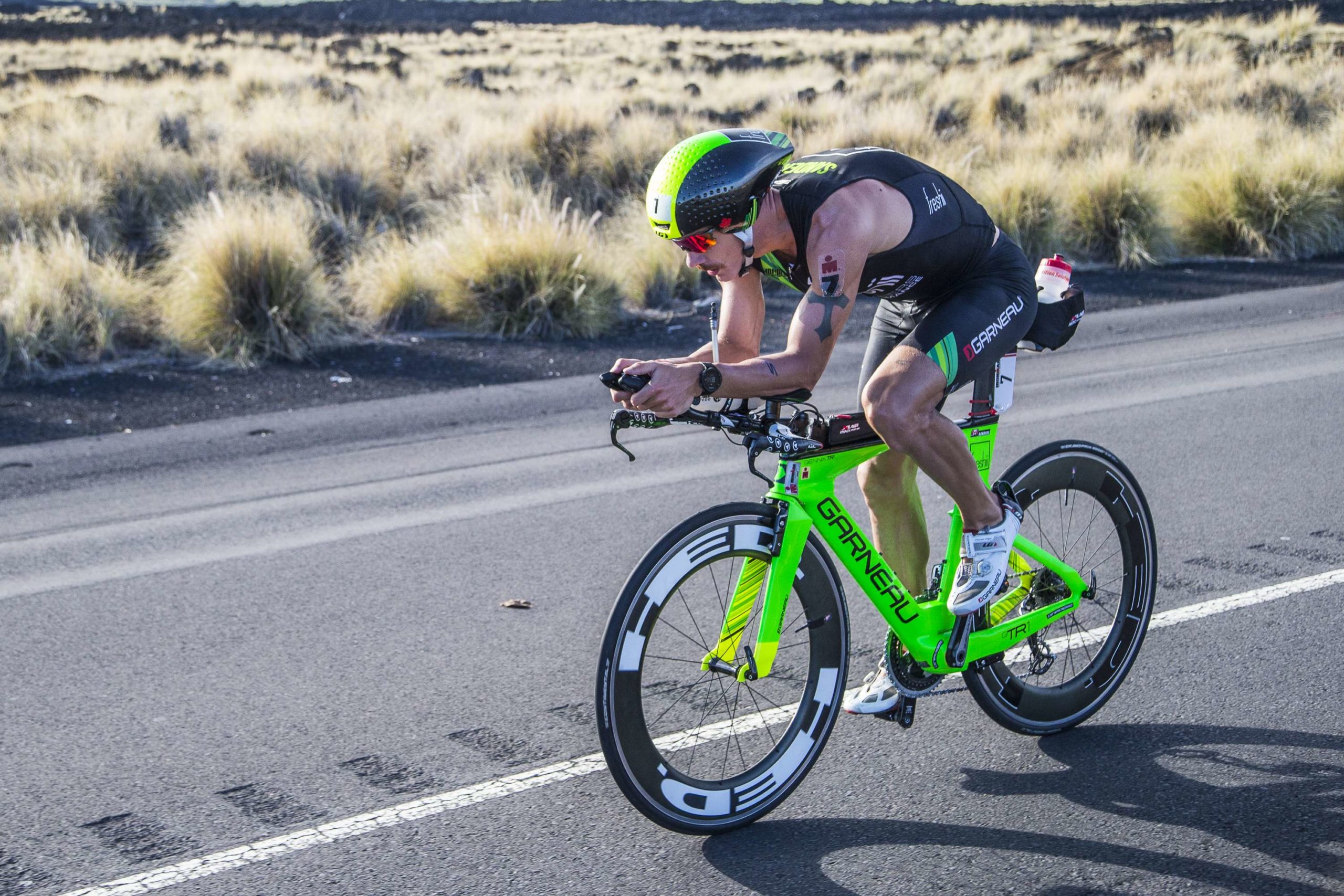
The Canadians
In a year that celebrated the exploits of Canada’s very own Peter Reid – the three-time Ironman world champion who was inducted into the Ironman Hall of Fame on the Wednesday before the race – the Canadians in the field had it tough at this year’s race.
All year there has been lots of talk about Lionel Sanders after his dominating 70.3 race record and his impressive win in Arizona last year. The Ironman 70.3 championship in Mooloolaba, though, provided some insight as to what Sanders could expect in a championship environment.
We caught up with Sanders shortly after the race: “I was doing all right at the beginning and it took a turn for the worse in a hurry,” the Windsor, Ont. native said. “I put all my eggs in the 70.3 worlds basket. I didn’t do enough training for this distance and I didn’t have the endurance. I had great power for 120 km [on the bike] and then I started to hit the wall real hard. I had to dig deep just to finish the bike. Then I had a good 18 km on the run and then I was walking. It was difficult to fathom running another 24 km.”
Despite the fact that he was two minutes faster in the water and nine minutes faster on the bike, Sanders realizes that to compete with the top Kona finishers he needs to go back to the drawing board.
“I think I’ll put Ironman on the back burner for a little bit and focus exclusively on 70.3,” Sanders said. “That gives me time to focus on my swim. The reality is that I can’t do well in these championship races without getting my swim I’d say a minimum of four to five minutes faster.”
Sanders would eventually finish in 8:44 in 29th place, one spot ahead of Brent McMahon, who also struggled out on the run course.
McMahon had come out of the water with the lead group and seemed in perfect position to be competitive through the bike, but was one of four rid – ers (including fellow contenders Frederik Van Lierde, Andreas Raelert and Patrick Lange) to receive a penalty as the men’s lead group started to bunch up along the Queen K and never got himself back into the game from there. He would come off the bike 10 minutes behind bike leader Sebastian Kienle and hung in the top 12 through 20 miles before the wheels fell off in the Energy Lab.
Trevor Wurtele rounded out the Canadian men’s contingent, finishing in 9:09:30.
Heather Wurtele, fresh off a third-place finish in Mooloolaba at the Ironman 70.3 worlds, came out of the water just ahead of Mirinda Carfrae and seemed to be in good company through the early stages of the bike amongst the first “chase” group along with Carfrae and Carrie Lester. Like the rest of the field who were eventually pummelled by Daniela Ryf’s devastating bike, Wurtele found herself in 17th position off the bike and would eventually run her way to 12th. While it wasn’t the race we know she has in Kona, it was nice to see her get to the line this year after the mechanical issues that put her out of last year’s race.
This story originally appeared in the November/December 2020 issue of Triathlon Magazine
